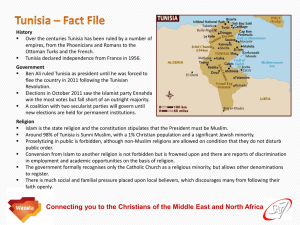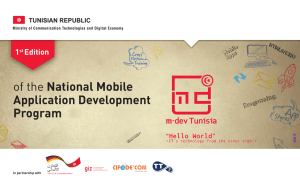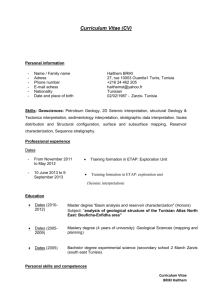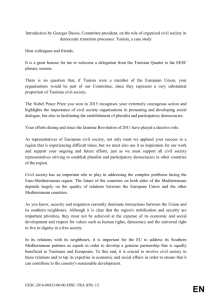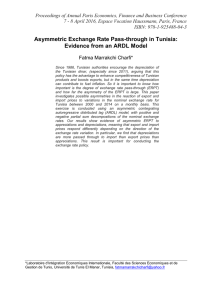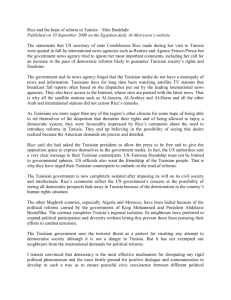Iceland recognises the efforts Tunisia has made following... in upholding the principles of plurality and respect for... ADVANCE QUESTIONS TO TUNISIA – ADD.1
advertisement
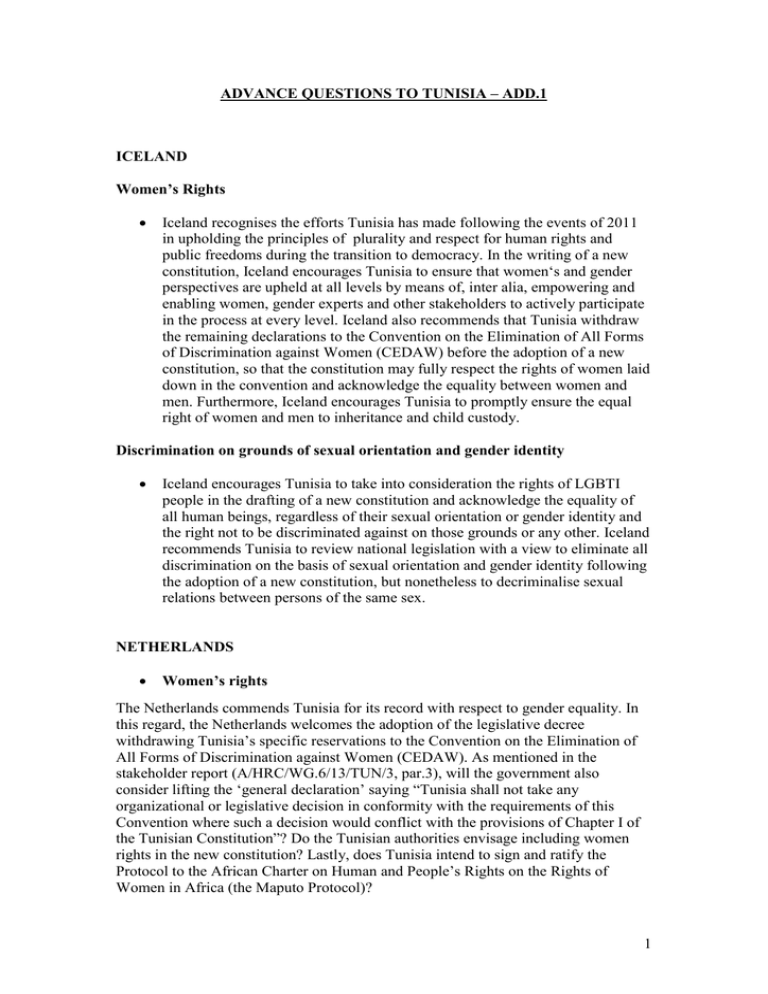
ADVANCE QUESTIONS TO TUNISIA – ADD.1 ICELAND Women’s Rights Iceland recognises the efforts Tunisia has made following the events of 2011 in upholding the principles of plurality and respect for human rights and public freedoms during the transition to democracy. In the writing of a new constitution, Iceland encourages Tunisia to ensure that women‘s and gender perspectives are upheld at all levels by means of, inter alia, empowering and enabling women, gender experts and other stakeholders to actively participate in the process at every level. Iceland also recommends that Tunisia withdraw the remaining declarations to the Convention on the Elimination of All Forms of Discrimination against Women (CEDAW) before the adoption of a new constitution, so that the constitution may fully respect the rights of women laid down in the convention and acknowledge the equality between women and men. Furthermore, Iceland encourages Tunisia to promptly ensure the equal right of women and men to inheritance and child custody. Discrimination on grounds of sexual orientation and gender identity Iceland encourages Tunisia to take into consideration the rights of LGBTI people in the drafting of a new constitution and acknowledge the equality of all human beings, regardless of their sexual orientation or gender identity and the right not to be discriminated against on those grounds or any other. Iceland recommends Tunisia to review national legislation with a view to eliminate all discrimination on the basis of sexual orientation and gender identity following the adoption of a new constitution, but nonetheless to decriminalise sexual relations between persons of the same sex. NETHERLANDS Women’s rights The Netherlands commends Tunisia for its record with respect to gender equality. In this regard, the Netherlands welcomes the adoption of the legislative decree withdrawing Tunisia’s specific reservations to the Convention on the Elimination of All Forms of Discrimination against Women (CEDAW). As mentioned in the stakeholder report (A/HRC/WG.6/13/TUN/3, par.3), will the government also consider lifting the ‘general declaration’ saying “Tunisia shall not take any organizational or legislative decision in conformity with the requirements of this Convention where such a decision would conflict with the provisions of Chapter I of the Tunisian Constitution”? Do the Tunisian authorities envisage including women rights in the new constitution? Lastly, does Tunisia intend to sign and ratify the Protocol to the African Charter on Human and People’s Rights on the Rights of Women in Africa (the Maputo Protocol)? 1 Security Sector: Impunity The Netherlands welcomes the engagement by the Tunisian authorities to undertake reforms in the different ministries, notably the Ministry of the Interior. After the revolution there is an urgent need for trust building measures to improve the relationship between the police and civilians. In this light, which measures will the Tunisian government take to fight impunity, both in the case of transgressions committed by security forces, as well as by civilians? Security Sector: Torture The pre-revolution government had a bad reputation with respect to the use of torture in the security system. The New Tunisia now has a chance to reverse this reputation and thereby also improve the relationship between the security forces and the Tunisian people. Which steps will the Tunisian government undertake to ensure torture or other forms of inhuman treatment are not used in any part of the security sector? Freedom of expression The Netherlands welcomes efforts by the Tunisian government to enlarge freedom of expression, and especially freedom of the press and media. However, in recent trials legislation restricting freedom of expression dating from before the revolution has been applied. Will the Tunisian government endeavor to implement the new press laws developed by the authorities after the revolution? Does the Tunisian government look into ways to include freedom of expression, press freedom and access to information in the Constitution? ROMANIA Romania welcomes a governmental policy that focuses on human rights education in higher education, for teachers, educators and staff, as well as those responsible for law enforcement, including judges, lawyers, prison staff, internal security officials and those employed in the social and military spheres. Could the Government elaborate on concrete measures of implementation of such policy? After the revolution, the authorities of Tunisia have taken a series of measures to rehabilitate human rights defenders. How does the Government intend to cooperate with them in formulating a comprehensive mechanism to achieve transitional justice within a framework of national consensus? SWEDEN The new Tunisian law on torture, enacted in 2011, is a welcomed move towards CAT, which Tunisia has acceded. However, it includes a statute of limitations of 15 years, which is contrary to international human rights and humanitarian law. How will the Government of Tunisia bring its legal stipulations as for the statute of limitations in line with international law as codified in the UN Basic Principles and Guidelines on the Right to a Remedy 2 and Reparation for Victims of Gross Violations of International Human Rights Law and Serious Violations of International Humanitarian Law? How will the Government of Tunisia act to protect those who peacefully exercise their freedom of assembly and expression from being subject to violent attacks by those opposing their views? 3
